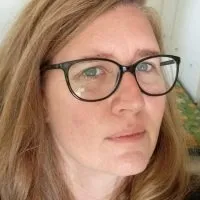Neurocognitive Sciences: Learning and Memory; Spatial Cognition; Cognitive Aging.
Dr. Maayan Merhav
Dr. Maayan Merhav

Accordion Title Areas of Interest
Areas of Interest
Accordion Title Biographical Info
Biographical Info
- 2000-2003: BSC in Biology - Hebrew uni. Jerusalem
- 2004-2006: MSC in Neurobiology. Haifa Uni. PI - Prof. Kobi Rosenblum. Topic - Taste memory consolidation.
- 2009-2013: PhD in Neurobiology. Haifa Uni. PIs - Prof. Avi Karni and Prof. Asaf Gilboa. Topic - Semantic learning via Fast Mapping.
- 2014-2017: PostDoc at the Aging, Cognition and Technology Lab. DZNE, Magdeburg, Germany. PI - Prof. Thomas Wolbers. Topic - Spatial learning in older adults.
- 2017-2019: PostDoc at the Memory Lab. Heriot Watt Uni, Edinburgh, UK. PI - Prof. Michaela Dewar. Topic - the effect of wakeful rest on memory consolidation.
- 2020-2021: Postdoc at Faculty of Architecture and Town planning, Technion. PI -Prof. Dafna Fisher-Gewirtsman. Topic - designing environments for the aging brain.
- Since 2020: A lecturer at Tel Hai College.
Accordion Title Research
Research
Neurocognitive Sciences: Learning and Memory; Spatial Cognition; Cognitive Aging.
Accordion Title Teaching
Teaching
- Psychobiology
- Virtual Reality as an Educational Tool
- Brain, Cognition and Language
- Neuropsychology of Memory
- Statistics
Accordion Title Awards
Awards
- 2004-2006: A two-years Scholarship of Excellence for MSc Students, University of Haifa.
- 2006: The department's award of excellence. The Neurobiology Department. University of Haifa.
- 2007: The rector’s prize for the best thesis of the year. University of Haifa.
- 2009-2013: A three-years Scholarship of Excellence for PhD students, University of Haifa.
- 2011: A prize for excellence from the Wolf foundation.
- 2020-2021: The Ministry of Science, Yitzhak Shamir Scholarship for Returning Israeli Scientists: A two-year postdoc at the Technion.
Accordion Title Publications
Publications
- Merhav M and Wolbers T. (2019). Aging and spatial cues influence the updating of navigational memories. Scientific Reports. Impact factor = 4.01, Q1.
- Merhav M, Riemer M and Wolbers T. (2019). Spatial updating deficits in human aging are associated with traces of former memory representations. Neurobiology of Aging. Impact factor = 4.4, Q1.
- A Frid, H Hazan, E Koilis, LM Manevitz, M Merhav, G Star (2016). The Existence of Two Variant Processes in Human Declarative Memory: Evidence Using Machine Learning Classification Techniques in Retrieval Tasks. Transactions on Computational Collective Intelligence XXIV, 117-133
- Merhav M, Karni A and Gilboa A. (2015). Not all declarative memories are created equal: Fast Mapping as a direct route to cortical declarative representations. NeuroImage. Impact factor = 6.45, Q1.
- Merhav M, Karni A and Gilboa A. (2014). Neocortical catastrophic interference in healthy and amnesic adults: A paradoxical matter of time. Hippocampus. Impact factor = 4.16, Q1.
- Mandel I, Paperna T, Volkowich A, Merhav M, Glass-Marmor L and Miller A (2012). The ubiquitin–proteasome pathway regulates claudin 5 degradation. Cell Bioch. Impact factor = 3.63, Q1.
- Merhav M, Rosenblum K. (2008). Facilitation of taste memory acquisition by experiencing previous novel taste is protein-synthesis dependent. Learn Mem. Impact factor = 5.85, Q1.
- Antion MD, Merhav M, Hoeffer CA, Reis G, Kozma SC, Thomas G, Schuman EM, Rosenblum K, Klann E. (2008). Removal of S6K1 and S6K2 leads to divergent alterations in learning, memory, and synaptic plasticity. Learn Mem. Impact factor = 5.85, Q1.
- Merhav M, Kuulmann-Vander S, Elkobi A, Jacobson-Pick S, Karni A, Rosenblum K. (2006). Behavioral interference and C/EBPβ expression in the insular-cortex reveal a prolonged time period for taste memory consolidation. Learn Mem. Impact factor = 5.32, Q1.
- Yefet K, Merhav M, Kuulmann-Vander S, Elkobi A, Belelovsky K, Jacobson-Pick S, Meiri N, Rosenblum K. (2006). Different signal transduction cascades are activated simultaneously in the rat insular cortex and hippocampus following novel taste learning. Eur J Neurosci. Impact factor = 4.0, Q1.
- Banko JL, Merhav M, Stern E, Sonenberg N, Rosenblum K, Klann (2006). Behavioral alterations in mice lacking the translation repressor 4E-BP2. Neurobiol Learn Mem. Impact factor = 4.24, Q1.
- Akirav I, Khatsrinov V, Vouimba RM, Merhav M, Ferreira G, Rosenblum K, Maroun (2006). Extinction of conditioned taste aversion depends on functional protein synthesis but not on NMDA receptor activation in the ventromedial prefrontal cortex. Learn Mem. Impact factor = 5.32, Q1.
Accordion Title Dr. Maayan Merhav CV
Dr. Maayan Merhav CV
Document name: Dr. Maayan Merhav CV
Dr. Maayan Merhav CV
(181.84 KB)
Accordion Title Presentations
Presentations
- November 2005 - The SFN (Society for Neuroscience) annual meeting, Washington DC. USA. Poster: “What does it take to make a stable taste-memory?”
- October 2006 - The SFN (Society for Neuroscience) annual meeting, Atlanta, Georgia. Poster: “Alterations in synaptic plasticity and impaired learning and memory in p70S6K knock-out mice.”
- October 2006 - The SFN (Society for Neuroscience) annual meeting, Atlanta, Georgia, USA. Poster: “Testing the "tagging hypothesis" in taste learning.”
- December 2011 - The ISFN (Israel Society for Neuroscience) annual meetings, Eilat, Israel. Poster: “New semantic learning through Fast Mapping is susceptible to catastrophic interference.”
- 2013 - The annual Neuropsychology conference, Haifa, Israel. Poster: “Neural substrates of rapid neocortical semantic learning.”
- October 2015 - The SFN (Society for Neuroscience) annual meeting, Chicago, USA. Poster: “Proactive interference as a source for age related navigational decline.”
- May 2016 - Psychology and Brain, Berlin, Germany: Oral presentation. “Proactive interference as a source for age related navigational deficit.” Invited.
- July 2016 - The International Conference on Memory (iCOM), Budapest, Hungary. Poster: “Does age-relate proactive interference impair navigation?”
- July 2016 - The International Conference on Memory (iCOM), Budapest, Hungary. Oral presentation: “Do memory representations gained via Fast-Mapping undergo changes in time?” Invited.
- November 2016 - The Interdisciplinary Symposium on Spatial Cognition in Aging & Neurodegeneration (iSCAN). Age related deficit in updating object-location associations.
- February 2017 - The Israeli Conference on Cognitive research (ISCOP). Acre, Israel. “Age-Related Deficit in Spatial Updating and Inefficient Suppression of Old Memories.”
- February 2018 - The Israeli Conference on Cognitive research (ISCOP). Acre, Israel. “How the navigational strategy affects spatial memory and spatial updating, in young and old adults?”
- September 2018 - Replay@CUBRIC, Cardiff, UK. “Does post-encoding, sustained attention impair memory consolidation?”
- November 2018 - The Interdisciplinary Symposium on Spatial Cognition in Aging & Neurodegeneration (iSCAN), 2018. “How the navigational strategy affects spatial memory and spatial updating, in young and old adults?”
- Ferbruary 2022 - The Israeli Conference on Cognitive research (ISCOP). Acre, Israel. "Modulation of Navigational Behavior by Spatial-Cue Reliability in Older Adults".
Accordion Title Link to



